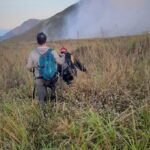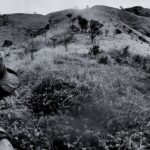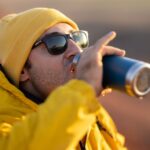IF AN EMERGENCY OCCURS...
If you think you are in an undesirable situation and you are not absolutely sure you can handle it, here are some of the first things you should do:
Learn More About First Aid in the Wilderness

Providing comfort to the injured is vital. Sure, you may not have any medical expertise, but a few encouraging words can make any injury feel a little less painful.
WHEN TO CALL FOR HELP
If you find yourself in any one of the following situations, call for help.

Physical injuries, such as a broken bone, need professional medical attention. Call for help immediately.
HOW TO CALL FOR HELP
If you are in a wilderness and need help, there are several ways to call for assistance:
- Cellphone
Call 911 or the local emergency services number. If you don't have signal, try moving to higher ground or an open area to improve your signal. Local guides may know areas with strong signals. Be aware that the National Emergency Hotline '911' may not be reliable, so it is important to save other emergency numbers such as the number of local police station and other local authorities. - Whistle
Blow your whistle in a series of three loud blasts, each lasting approximately 3 seconds. Give yourself a few seconds after you’ve completed the three blast pattern, and then repeat as long as you can to give yourself the best chance of being heard. This is a universal distress signal that can be heard over long distances. - Flashlight
Make three short flashes, pause for a few seconds, and then three short flashes again. Repeat this pattern as long as you can to give yourself the best chance of being seen. This is a commonly recognized distress signal. - Other Signaling Devices And Methods
Satellite phones, Personal Locator Beacon, signal mirror and smoke signal (if you can build a fire)
When lost, stranded, or injured in the wilderness, your cellphone, whistle, flashlight and other signaling devices can be your lifeline to the outside world.
Learn More About Wilderness Communication
If You Can Make A Call Or Text, Provide As Much Information As Possible, Such As:
MORE TIPS AND ADVISE

Local guides can be a valuable resource when it comes to wilderness emergency. If all your communication tools fail, they can go down to get help, or carry you down if you are hurt.









3 comments
Pingback: 10 Things Not To Pack In Your Philippine Wilderness Adventure – peaksify.com
Pingback: Survival by the Clock – peaksify.com
Pingback: 10 Survival Myths That Can Get You Killed – peaksify.com